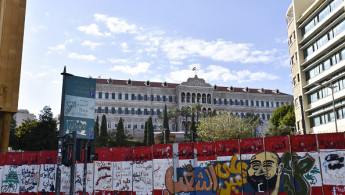Western, regional powers urge Lebanon to elect president
Western and regional powers have warned they will reconsider "all ties" with Lebanon if parliament fails to elect a president amid a worsening financial crisis, the prime minister's office said Monday.
The warning came after the ambassadors or representatives of the United States, France, Saudi Arabia, Qatar and Egypt met Prime Minister Najib Mikati in Beirut.
Lebanon has been without a president since Michel Aoun's mandate expired in October, while a caretaker cabinet with limited capabilities has been overseeing the government's responsibilities as a financial collapse stretches into its third year.
"Failing to elect a new president means all ties with Lebanon will be reconsidered," the diplomats said, according to a statement from the prime minister's office.
"Real support" for Lebanon will only come after a president is elected and after reforms needed to access billions of dollars in loans from international lenders are enacted, it added.
Representatives of the five nations had met last week in Paris to discuss Lebanon's woes.
The international community has long urged Lebanese leaders to end months of political wrangling and stem the financial meltdown.
But decision-making in Lebanese politics can take months of horse-trading between foreign-backed sectarian leaders, with Aoun's election in 2016 coming after more than two years without a president.
On the race for Lebanon's next president
— The New Arab (@The_NewArab) October 1, 2022
✍ @DarioSabaghi https://t.co/suQxSPYeBd
In the absence of political action, the market value of the Lebanese pound hit a new record low Monday of more than 68,000 to the US dollar. On Tuesday, it surpassed 72,000.
Lebanon's divided lawmakers have made 11 unsuccessful attempts to name a new president and have not convened since January 19.
Lawmakers supporting the powerful Shia movement Hezbollah and those opposing the Iran-backed group have been divided on Lebanon's next leader - but neither side has a clear majority.
Two Lebanese MPs have been holding a sit-in in parliament for nearly a month in hopes of jolting fellow lawmakers into action.





 Follow the Middle East's top stories in English at The New Arab on Google News
Follow the Middle East's top stories in English at The New Arab on Google News


